Editorial Note: This post is part of how to study the Bible (the complete series).
As I step into my new role as Director of Family Ministries at St. Edward’s, I’ve been evaluating where all of the young people are at in their Christian walk. I’m responsible for everything from the nursery, to children’s Sunday School, to youth group. And as I evaluate everything, I’ve been seeing a real need to simple get them more grounded in the Word. We just need to get them a solid introduction to the Bible.
It’s a smaller church, so the kids and youth programs aren’t packed yet. But the kid’s Sunday School class consisted of one class for everything from K thru 5th grade. So step one was to break that up into two groups.
K-3rd meets and does an age-appropriate lesson on one of the readings for the week from the Lectionary.
And 4th and 5th graders are breaking out into a separate class to just learn the Bible. It’s not too in-depth just yet, but we are just opening the Bible together, reading it out loud, and discussing what we’re reading. We’re not reading the entire Bible out loud together like that, but enough to build a much stronger familiarity with what’s in there and where to find it. My goal is better prepare them for the deeper conversations we’ll be having when they eventually move up to youth group.
That brings me to what I’m doing with the youth group. I’m seeing a need to help them build a strong foundation and a deeper relationship with the Word. To accomplish that, I’ll be teaching a series for them which gets them an introduction to the Bible canon, a short survey of the Old and New Testaments, and some basic study and interpretation tools.
This is my first lesson in that series.
Catechism – The Holy Scriptures (BCP p. 853)
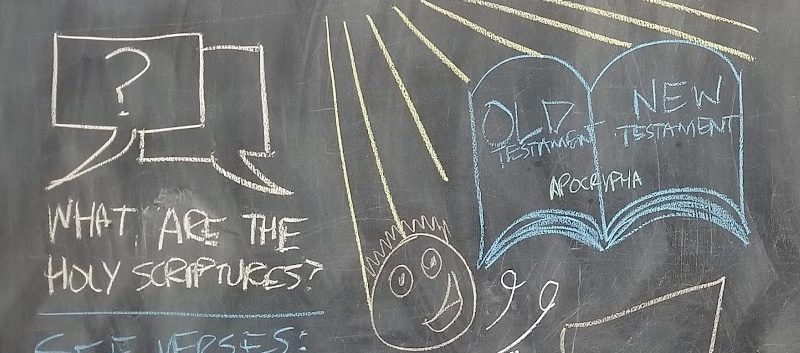
As a starting off point, I want to look at what the Catechism in the Book of Common Prayer says about the Bible. These are the questions and answers, along with a couple of my own thoughts on each.
Q: What are the Holy Scriptures?
A: The Holy Scriptures, commonly called the Bible, are the books of the Old and New Testaments; other books, called the Apocrypha, are often included in the Bible.
My thoughts: Reading the Holy Scriptures is different than reading other types of books. The fact that they are called “holy” means that they are sacred, set apart, from other writings. It’s something that we should ingest and let it become part of who we are, our very being. I love what Eugene Peterson says about reading the Bible in his book called Eat This Book: A Conversation in the Art of Spiritual Reading…
Christian reading is participatory reading, receiving the words in such a way that they become interior to our lives, the rhythms and images becoming practices of prayer, acts of obedience, ways of love.
Q: What is the Old Testament?
A: The Old Testament consists of books written by the people of the Old Covenant, under the inspiration of the Holy Spirit, to show God at work in nature and history.
My thoughts: There are a couple things I really love about the Old Testament. First, I love seeing how God worked through people throughout history. And we see all over the place where He used the unexpected people to do His work. David was the least likely of his brothers to be chosen as the next king. Rahab was a prostitute (and not even an Israelite). Moses stuttered.
And the other thing I love is that we learn a great deal about God’s character and his heart. He is always for His people, even when they turn their backs on Him. He’s always there.
Q: What is the New Testament?
A: The New Testament consists of books written by the people of the New Covenant, under the inspiration of the Holy Spirit, to set forth the life and teachings of Jesus and to proclaim the Good News of the Kingdom for all people.
My thoughts: This is the God we meet in the Old Testament, personified. He shows us the Way. It’s an upside-down wisdom where the first is last and the last is first. It was a radical message for the time it was written, and is equally as radical today. And at the core of the Message… redemption for all. Powerful.
Q: What is the Apocrypha?
A: The Apocrypha is a collection of additional books written by the people of the Old Covenant, and used in the Christian Church.
My thoughts: While not part of the canon of Scriptures, these are valuable writings providing more history and perspective.
Q: Why do we call the Holy Scriptures the Word of God?
A: We call them the Word of God because God inspired their human authors and because God still speaks to us through the Bible.
My thoughts: I love the picture (we’ll discuss in a moment) of the Holy Spirit inspiration (see also 2 Timothy 3:16-17 about the Scriptures being God-breathed). But I think that one of the big keys to this is how God uses these writings from thousands of years ago to still talk with us today. That kind of reach cannot be obtained without the Holy Spirit also guiding us in our reading and understanding of the very words He inspired.
Q: How do I understand the meaning of the Bible?
A: We understand the meaning of the Bible by the help of the Holy Spirit, who guides the Church in the true interpretation of the Scriptures.
My thoughts: As Christians, we have the Helper who Jesus promised would come after Him. So when we read the Scriptures, we’re not doing it alone. We have the Holy Spirit to help reveal truths to us, especially at the times we need to understand certain things. That why you could read a passage a hundred times, and then at a certain time in your life it opens up and has fuller meaning to you. The Book is alive because the Living God resides in those pages.
The Holy Spirit and the Scriptures

knowing this first of all, that no prophecy of Scripture comes from someone’s own interpretation. For no prophecy was ever produced by the will of man, but men spoke from God as they were carried along by the Holy Spirit.
This passage from 2 Peter 1: 20-21 tells us how prophetic writers of the Scriptures were moved by the Holy Spirit. The word in the original Greek is pheromone, which is the same word used in this passage from the book of Acts (ch 27, v 15, 17)…
And when the ship was caught and could not face the wind, we gave way to it and were driven along.
After hoisting it up, they used supports to undergird the ship. Then, fearing that they would run aground on the Syrtis, they lowered the gear, and thus they were driven along.
The Scriptures weren’t written by some guys who just had some ideas. God used these human authors as if He was the wind and they were the sails. Without the Holy Spirit as the driving force, they wouldn’t have gone anywhere.
Evidences for the Inspiration of Scripture
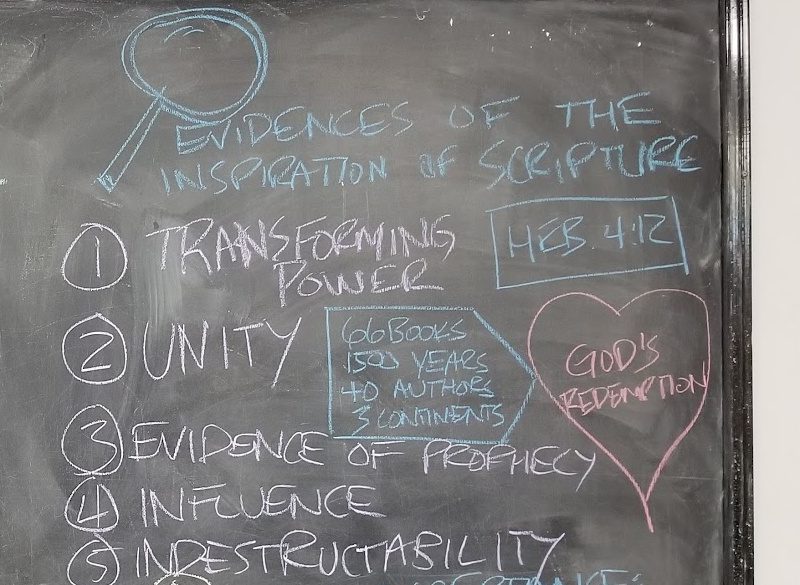
1. Transforming Power
For the word of God is living and active, sharper than any two-edged sword, piercing to the division of soul and of spirit, of joints and of marrow, and discerning the thoughts and intentions of the heart.
Hebrews 4:12
2. Unity of the Bible
The Bible consists of 66 books, written over a 1,500 year period, by at least 40 different authors, scattered across 3 different continents. All of that, and yet there’s a single, consistent message across all of it… God’s redemption of human beings.
3. Evidence of Prophecy
In Evidence for Christianity, Josh McDowell references Wilbur Smith…
It is the only volume ever produced by man, or a group of men, in which is to be found a large body of prophecies relating to individual nations, to Israel, to all the peoples of the earth, to certain cities, and to the coming of One who was to be the Messiah. The ancient world had many different devices for determining the future, known as divination, but not in the entire gamut of Greek and Latin literature, even though they use the words prophet and prophecy, can we find any real specific prophecy of a great historic event to come in the distant future, mot any prophecy of a Savior to arise in the human race.
4. Influence of the Bible
McDowell references Geisler and Nix…
Indeed, no great moral or religious work in the world exceeds the depth of morality in the principle of Christian love, and none has a more lofty spiritual concept than the biblical view of God. The Bible presents the highest ideals known to men, ideals that have molded civilization.
5. Apparent Indestructibility
McDowell notes…
The Bible has withstood vicious attacks by its enemies. Many have tried to burn it, ban it, and “outlaw it from the days of Roman emperors to present-day Communist-dominated countries.”
Further…
Voltaire, the noted French infidel who died in 1778, said that in one hundred years from his time Christianity would be swept from existence and passed into history.
Regardless, Christianity (and the Bible) has not only survived, but thrived.
Acceptance and Use In the Early Church
I put you under oath before the Lord to have this letter read to all the brothers.
1 Thessalonians 5:27
Until I come, devote yourself to the public reading of Scripture, to exhortation, to teaching.
1 Timothy 4:13
And when this letter has been read among you, have it also read in the church of the Laodiceans; and see that you also read the letter from Laodicea.
Colossians 4:16

Modern Application of This Introduction To the Bible
Probably the most important characteristic about the Bible is its life-transforming power. No other text in the history of the world has matched its track record, and that’s largely due to the Holy Spirit being alive and active in it and in us as we read it.
So its easy to understand why the liturgical practices of the Episcopal (and Anglican) traditions model the practice of the early church in simply reading the writings. The church during the first couple centuries would make it a practice to just read, often for hours. As I understand it, they even had the practice of stopping to ask if anyone had to leave or if they could keep on reading. Modern church services don’t go to that extent. But the act of simply reading the Bible as a large portion of the worship service is something that alone can bring healing and life change to worshipers.
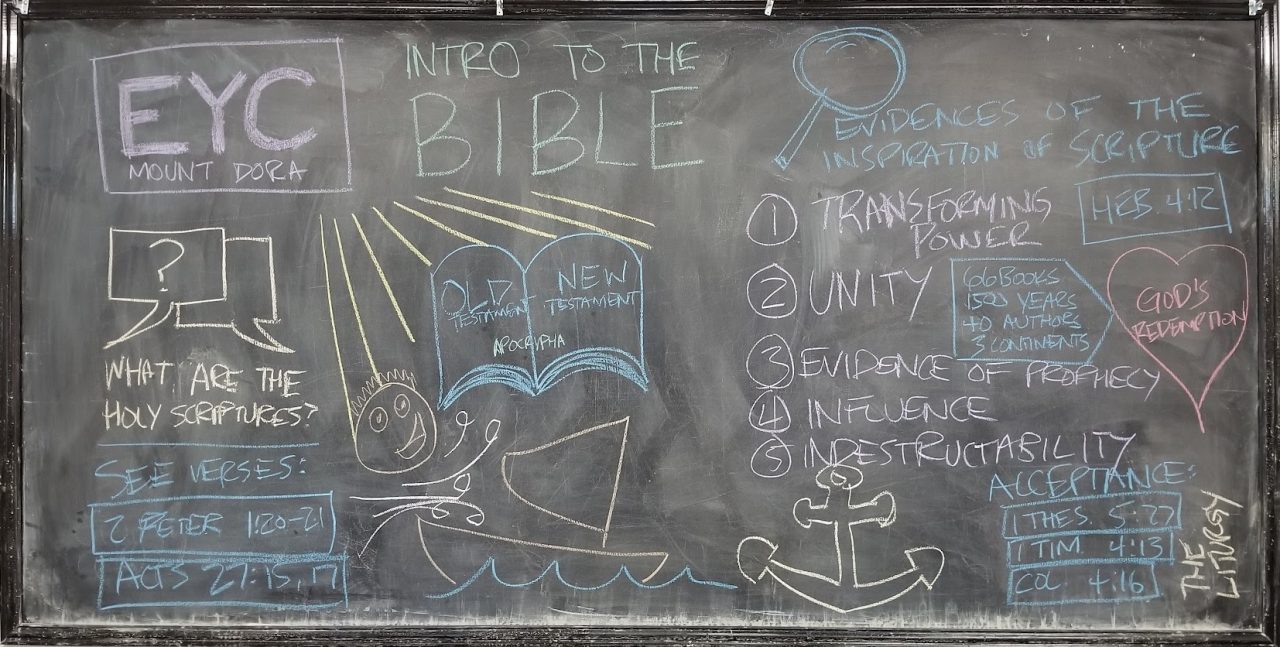

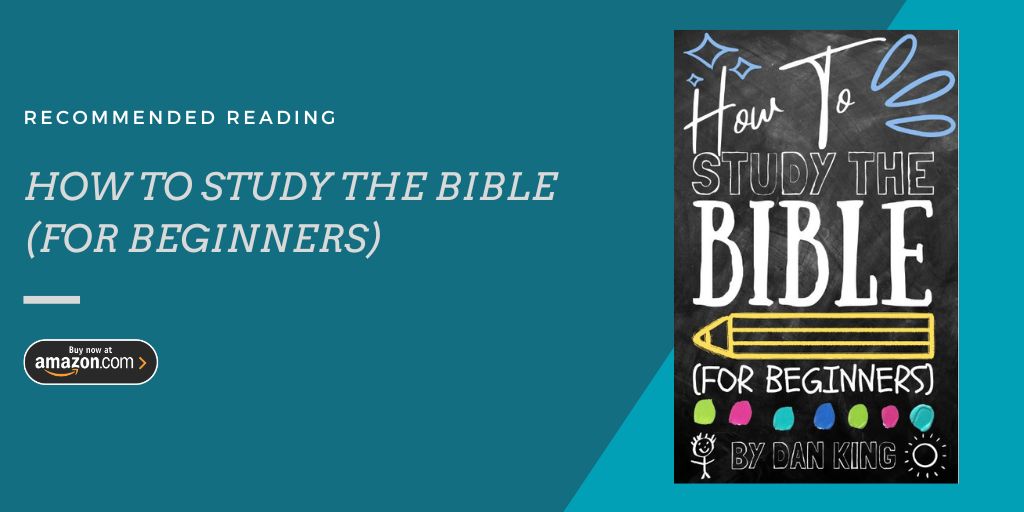
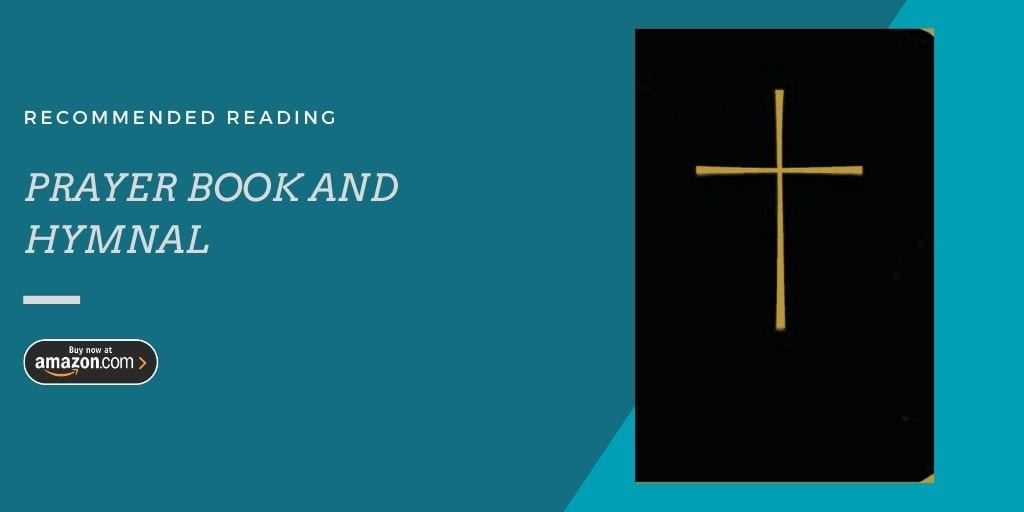
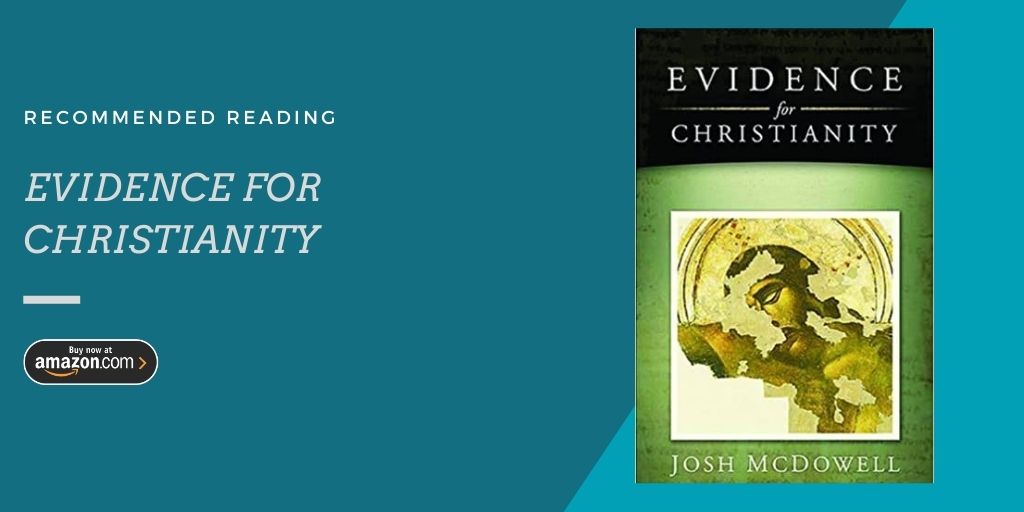
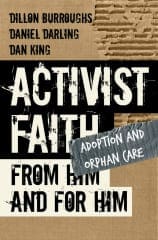


0 Comments